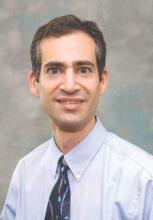User login
The Society of Hospital Medicine (SHM) has announced it will launch a second iteration of the Multi-Center Medication Reconciliation Quality Improvement Study, a program focused on improving ways for medications to be prescribed, documented, and reconciled accurately and safely during transitions of care.
The initial Multi-Center Medication Reconciliation Quality Improvement Study (MARQUIS) was launched in 2010 by SHM with a grant from the Agency for Healthcare Research and Quality (AHRQ). The new version of the program, called MARQUIS2 and also supported by an AHRQ grant, will be managed through SHM’s Center for Hospital Innovation and Improvement in partnership with Brigham and Women’s Hospital in Boston.
MARQUIS and MARQUIS2 are mentored implementation studies developed to assist hospitals and hospital-based clinicians in reducing medication errors, adverse drug events, and patient harm during transitions of care. Beginning in April 2016, SHM will work with 18 hospitals to identify, implement, and sustain medication reconciliation interventions with guidance from expert physician mentors.
The medication reconciliation process is intended to help hospitalist physicians and other providers avoid medication errors such as omissions, duplications, dosing errors, and adverse drug interactions.
“SHM’s mentored implementation model and extensive experience in implementing key quality improvement programs across the country will prove to be an asset in assisting the 18 hospitals in reducing potentially harmful medication discrepancies,” Dr. Jeffrey L. Schnipper, director of clinical research, BWH Hospitalist Service, Brigham and Women’s Hospital, and principal investigator for MARQUIS2, said in a statement.
Key components in MARQUIS2 include educating providers on how to take a best possible medication history, improving access to preadmission medication sources, encouraging patient ownership of medication lists, and identifying patients at higher risk for adverse drug events in need of more intensive efforts.
“The implementation of MARQUIS2 will ultimately improve patient safety, teamwork, communication, and care transitions at these sites over the next year, providing resources and best practices that best suit each site’s individual environment,” Dr. Schnipper said.
On Twitter @richpizzi
The Society of Hospital Medicine (SHM) has announced it will launch a second iteration of the Multi-Center Medication Reconciliation Quality Improvement Study, a program focused on improving ways for medications to be prescribed, documented, and reconciled accurately and safely during transitions of care.
The initial Multi-Center Medication Reconciliation Quality Improvement Study (MARQUIS) was launched in 2010 by SHM with a grant from the Agency for Healthcare Research and Quality (AHRQ). The new version of the program, called MARQUIS2 and also supported by an AHRQ grant, will be managed through SHM’s Center for Hospital Innovation and Improvement in partnership with Brigham and Women’s Hospital in Boston.
MARQUIS and MARQUIS2 are mentored implementation studies developed to assist hospitals and hospital-based clinicians in reducing medication errors, adverse drug events, and patient harm during transitions of care. Beginning in April 2016, SHM will work with 18 hospitals to identify, implement, and sustain medication reconciliation interventions with guidance from expert physician mentors.
The medication reconciliation process is intended to help hospitalist physicians and other providers avoid medication errors such as omissions, duplications, dosing errors, and adverse drug interactions.
“SHM’s mentored implementation model and extensive experience in implementing key quality improvement programs across the country will prove to be an asset in assisting the 18 hospitals in reducing potentially harmful medication discrepancies,” Dr. Jeffrey L. Schnipper, director of clinical research, BWH Hospitalist Service, Brigham and Women’s Hospital, and principal investigator for MARQUIS2, said in a statement.
Key components in MARQUIS2 include educating providers on how to take a best possible medication history, improving access to preadmission medication sources, encouraging patient ownership of medication lists, and identifying patients at higher risk for adverse drug events in need of more intensive efforts.
“The implementation of MARQUIS2 will ultimately improve patient safety, teamwork, communication, and care transitions at these sites over the next year, providing resources and best practices that best suit each site’s individual environment,” Dr. Schnipper said.
On Twitter @richpizzi
The Society of Hospital Medicine (SHM) has announced it will launch a second iteration of the Multi-Center Medication Reconciliation Quality Improvement Study, a program focused on improving ways for medications to be prescribed, documented, and reconciled accurately and safely during transitions of care.
The initial Multi-Center Medication Reconciliation Quality Improvement Study (MARQUIS) was launched in 2010 by SHM with a grant from the Agency for Healthcare Research and Quality (AHRQ). The new version of the program, called MARQUIS2 and also supported by an AHRQ grant, will be managed through SHM’s Center for Hospital Innovation and Improvement in partnership with Brigham and Women’s Hospital in Boston.
MARQUIS and MARQUIS2 are mentored implementation studies developed to assist hospitals and hospital-based clinicians in reducing medication errors, adverse drug events, and patient harm during transitions of care. Beginning in April 2016, SHM will work with 18 hospitals to identify, implement, and sustain medication reconciliation interventions with guidance from expert physician mentors.
The medication reconciliation process is intended to help hospitalist physicians and other providers avoid medication errors such as omissions, duplications, dosing errors, and adverse drug interactions.
“SHM’s mentored implementation model and extensive experience in implementing key quality improvement programs across the country will prove to be an asset in assisting the 18 hospitals in reducing potentially harmful medication discrepancies,” Dr. Jeffrey L. Schnipper, director of clinical research, BWH Hospitalist Service, Brigham and Women’s Hospital, and principal investigator for MARQUIS2, said in a statement.
Key components in MARQUIS2 include educating providers on how to take a best possible medication history, improving access to preadmission medication sources, encouraging patient ownership of medication lists, and identifying patients at higher risk for adverse drug events in need of more intensive efforts.
“The implementation of MARQUIS2 will ultimately improve patient safety, teamwork, communication, and care transitions at these sites over the next year, providing resources and best practices that best suit each site’s individual environment,” Dr. Schnipper said.
On Twitter @richpizzi

